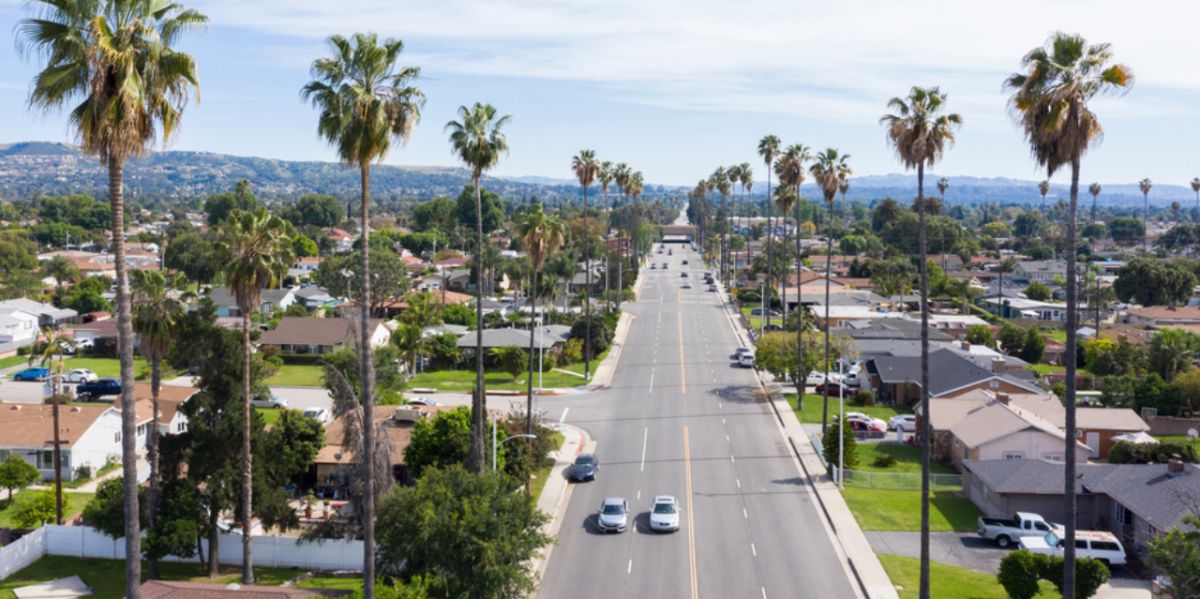
Los Angeles is the second-most populous city in the US. It's a popular destination for both holidaymakers and those looking to relocate more permanently. LA is home to almost four million people, and the city is a diverse and dynamic environment with lots to discover and explore. However, before you get to live your LA life, you will need to find a place to stay. In this article, we will look into the basics of apartment hunting in the city, from choosing the right neighborhood to evaluating the rent and cost of living in Los Angeles.
Where to live in Los Angeles: Neighborhoods
Where you decide to settle in Los Angeles can be guided by various factors. However, one important thing to keep in mind is the potential commute. It is generally not advised to venture too far out from where you work or study — commute times in Los Angeles can be long and will have a direct effect on your quality of life. What's more, traffic in the city can be notoriously bad — and parking is rarely pleasant. On the other hand, renting in central LA neighborhoods doesn't come cheap.
Depending on how flexible you are with your budget and what level of comfort you are looking for, you may be looking at just a few options — or your opportunities may seem endless. Los Angeles County stretches for an impressive 4,751 square miles, so you have a good chance of finding something that will suit you.
Let's start by looking at some of LA's most popular neighborhoods.
Hollywood
Beyond its iconic entertainment industry roots, Hollywood is now a bustling neighborhood filled with startups, small businesses, and coworking spaces. While high-rises dominate residential real estate, you can still find more budget-friendly options compared to Beverly Hills. The area has good freeway access and is lively, but traffic and crowds are constant. Average rent here is around $2,730 monthly.
Mid-City
Positioned as LA's central neighborhood, Mid-City provides convenient access to various parts of the city, even without a car. The housing options range from century-old buildings to charming Spanish duplexes and luxury bungalows. Currently, average rents hover around $3,445, making it one of the more expensive central spots.
Downtown LA (DTLA)
Once a 9-to-5 district, Downtown LA has become a vibrant hub for dining, nightlife, and entertainment. Living here can be a time-saver if you work in DTLA, with average rents sitting at around $3,000. The area is also one of LA's best-connected by public transport, with Metro rail and bus lines converging here, so a car is optional. However, Skid Row and some surrounding blocks are best avoided for safety reasons.
Venice
Known for its beach lifestyle and surf culture, Venice attracts artists and tech professionals alike. Dubbed "Silicon Beach" for its tech startup presence, it's a hotspot for young professionals. Living in Venice comes at a price, with the rent for two-bedroom apartments exceeding $4,000. This is one of LA's most expensive coastal neighbourhoods.
Sherman Oaks
If you're moving to LA with a family, consider Sherman Oaks. This family-friendly neighborhood in the San Fernando Valley offers convenience, excellent schools, and a peaceful atmosphere. Major attractions are centered around Ventura Blvd, where you'll find eateries, boutiques, and bars. The average rent is around $2,400 for an apartment, although for a larger home it can be more like $5,900.
West Hollywood (WeHo)
Often described as a "city within a city", WeHo is the cultural heart of LA. It boasts trendy boutiques, renowned restaurants, and vibrant LGBTQ nightlife. With excellent walkability and connections to other parts of LA, it's a favored location for many. Average rents in West Hollywood are around $3,400 - $3,900, depending on unit size.
Beverly Grove
Offering a more affordable alternative to upscale neighborhoods, Beverly Grove features a high-end shopping mall, hip dining spots, and the popular Original Farmers Market. Apartment prices here start at about $4,100, making it a very expensive place to live.
Silver Lake
Known for its green spaces, bohemian vibe and manageable traffic, Silver Lake attracts a diverse mix of residents, including young professionals and creatives. The neighborhood's easy access to various parts of the city makes it a desirable choice. Average rents in Silver Lake are around $2,400, making it relatively affordable, although larger rentals can run much higher.
Pasadena
Pasadena is especially appealing to expats and families who want a more suburban feel. With freeway access to central LA and a mix of single-family homes and apartments, it feels more community-centric than other neighbourhoods. A one-bedroom averages about $2,625, with higher rents for family-sized units.
Santa Monica
This neighborhood offers both city living and beach lifestyle. The Metro Expo Line links Santa Monica to Downtown, making it attractive to commuters. However, housing is among the most expensive in Los Angeles. The North of Montana area, in particular, has some of the highest rents in the city, averaging well above $4,700.
Other affordable picks
For budget renters, neighborhoods like South Central LA, Lincoln Heights, and Arlington Heights offer smaller units averaging $1,500–$1,800, among the cheapest in the city currently.
The cost of living in Los Angeles
Although it has an amazing lifestyle and career opportunities, LA ranks among the top ten most expensive cities in the United States. This means that careful budgeting is essential for your stay in the City of Angels.
Rent in Los Angeles can be a significant portion of your expenses, particularly if you opt for a spacious place in one of the trendy neighborhoods. However, it's worth noting that you can discover more budget-friendly accommodation options by exploring areas a bit further from the city center, although this may require some extra research.
The average rent in Los Angeles is now $2,795 citywide for all unit types, while the metro median sits at $2,818. Of course, averaging rental prices is not always the most useful guide, as accommodation options can be so variable. Breaking it down by size and type can make this clearer:
- Studios average $1,707
- One-bedrooms average $2,183
- Two-bedrooms average $3,007 (apartments ~$3,319, houses ~$4,003)
- Three-bedrooms start around $4,319 and can be higher.
Unlike many US cities, LA offers a wide housing variety, from studios and condos to bungalows, beachfront homes, and mansions.
When budgeting for your stay, consider additional expenses like utilities. Monthly utility costs average around $214, covering energy and WiFi. Lease contracts typically incorporate water charges, maintenance fees, and trash services, and rental properties generally come equipped with basic but essential home appliances. Dishwashers, washers, refrigerators, and AC units are common, with some rentals offering parking.
Rent increases are common in LA but have slowed to about 3–4% annually, down from the 5–8% seen in prior years. Vacancy rates are around 4–5% in premium districts, slightly higher in mid-range neighborhoods.
Be aware that Los Angeles rents remain about 33% higher than national averages, with the typical US one-bedroom renting for $1,600.
However, Los Angeles has tenant protections such as rent-controlled units (check via ZIMAS property database) and the Rent Stabilization Ordinance (RSO), which continues to cap hikes.
Looking for rental accommodation in Los Angeles
Finding a rental in Los Angeles is competitive, but multiple strategies can help.
The internet is a primary resource: popular platforms include ApartmentList, Apartments.com, Rent.com, Trulia, WestsideRentals, Zillow, and AirBnB. These often have mobile apps for easy use.
You can also enlist agents, ask for referrals, or spread word-of-mouth in local communities to improve your chances. Casting a wide net and acting quickly when you find a suitable property are crucial in LA's property market.
Leasing conditions and formalities in Los Angeles
Lease agreements in Los Angeles are generally drawn between the two parties before moving into the apartment. The duration of the lease is entirely dependent on how long you will be renting, although most landlords prefer long-term rent and agreements of at least a year. You may also be able to get a better deal if you sign a longer rental agreement.
The conditions and terms of the lease do not change throughout the lease period. Hence, conditions cannot be changed overnight, which is one of the most prominent benefits of a lease agreement in Los Angeles. Expats can hold on to the apartment for more extended periods without complying with new conditions.
Here are a few other things to consider when signing a lease in LA:
- Check the property before agreeing to rent it. If you are still in your home country and are renting remotely, consider asking your friends, family, or colleagues who are already in LA to do a walkthrough of the property and make sure that everything is in order.
- Check the guest policy. In some cases, landlords will have a clause in the leasing agreement about long-term guests. Thus, if you plan to have family or friends visit you while you are in the US, it's best to make sure that they can stay with you.
- If you are a student, your rental agreement may also include a guarantor clause. This means that you will need to provide a guarantor (in most cases, this would be one of your parents) who will be liable for rent payments if you aren't able to pay rent.
- Make sure to get everything in writing. If there is a specific set of rules that comes with renting a property, get these rules in writing. This way, you will be reminded of all the rules you must follow. Plus, it can also help you manage potential future disputes.
- Consult an expert. Finally, if you have further questions about your lease, it is best to get a professional opinion. Consult a lawyer or real estate agent and ensure the contract you are signing is legally accurate.
Although a lease agreement is legally binding, you can get evicted from your apartment if you fail to pay rent, constitute a nuisance, or break the rules stated in the lease agreement.
Buying property in Los Angeles
Buying a home in Los Angeles can be a smart long-term investment, especially for expats planning to stay several years. Unlike in many other nations, foreigners can purchase property without U.S. citizenship or permanent residency. To do so,l just need an Individual Taxpayer Identification Number (ITIN) to handle legal business and tax processes.
Financing
Most expats rely on taking on a mortgage to be able to enter the housing market. Approval depends on your visa type, credit score, and ability to provide a down payment of at least 20–30%. It's important to compare lenders and request full loan cost breakdowns, including interest and closing fees.
Where to buy
Median home values in greater Los Angeles hover around $1.2 million (late 2025), although prices vary widely. Suburban areas like Pasadena, Sherman Oaks, and Culver City offer better value than coastal zones like Santa Monica or Venice. Browse real estate listings and determine realistic neighborhoods and budgets before getting realtors involved.
Professional help
A certified realtor can help you through property searches and negociation. You can find one via professional listings or by asking around online for recommendations. You'll also need a notary (escrow officer) to verify ownership, settle outstanding debts, and complete the title transfer. In California, you do not actually legally need a lawyer to buy or sell property. The process is designed so that realtors, escrow officers, and title companies handle most of what lawyers would do elsewhere.
Important:
Always check that the property has no unpaid liens or taxes and that all transactions go through legitimate escrow channels.
Useful links:
ZIMAS (You can use this website to check if a property is rent-controlled or verify housing details)
RSO LA (Official guidance on rent increases and tenant rights)
We do our best to provide accurate and up to date information. However, if you have noticed any inaccuracies in this article, please let us know in the comments section below.








